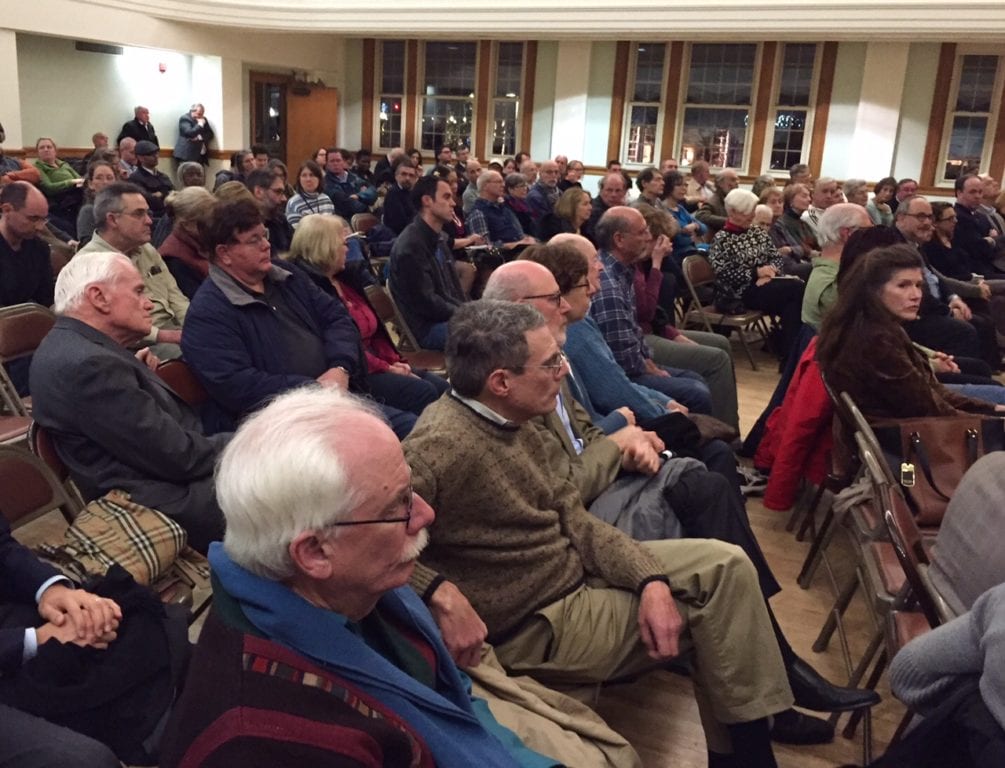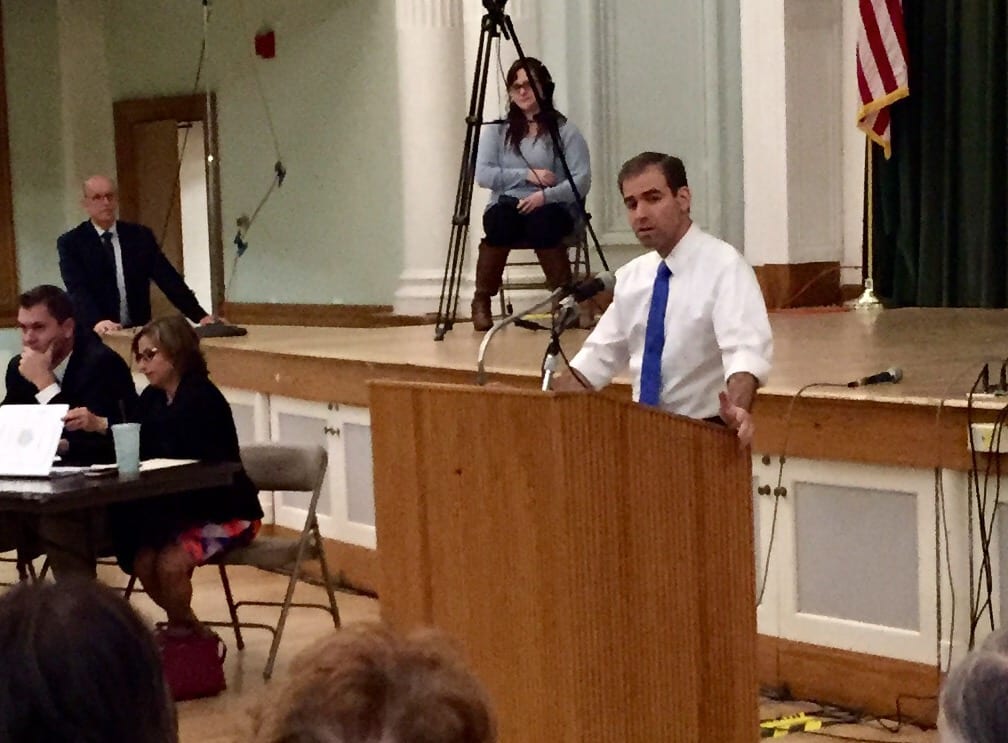Tuesday night’s meeting provided the opportunity for Hartford Mayor Luke Bronin to explain the nature of the city’s financial problems, discuss possible solutions that could include elements of regionalized services, and respond to questions from West Hartford residents.

A crowd of approximately 200 attended a town hall meeting with Hartford Mayor Luke Bronin in West Hartford. Photo credit: Ronni Newton
By Ronni Newton
The state’s future success, and West Hartford’s continued success, is intrinsically tied to having a successful capital city – something that must be addressed on a statewide level, Hartford Mayor Luke Bronin told a crowd of approximately 200 who attended a community forum hosted by the West Hartford Town Council at Town Hall Tuesday night.
“It’s in your interest to have a strong city,” Bronin said, because West Hartford can’t be a suburb of nowhere. “You can’t expect a suburb to thrive if its urban core collapses.”
More than a dozen citizens and several West Hartford Town Council members asked questions or made statements during the forum, several taking the opportunity to praise Bronin for his forthrightness and for taking on the challenge of trying to fix Hartford’s financial mess.
Town Manager Ron Van Winkle and the Town Council invited Bronin to the forum so that West Hartford residents could understand the challenges of addressing the city’s fiscal woes. Bronin, Van Winkle said, has been open and honest about the city’s financial condition and the “enormous mistakes” that were made in the past. “If I were to do this in West Hartford you would fire me,” said Van Winkle, noting some of the past decisions Hartford has made like selling assets to pay expenses.
Bronin plans to meet with residents in other area towns as well, and will attend a forum in Rocky Hill next week.

Hartford Mayor Luke Bronin spoke at West Hartford Town Hall Tuesday night. Photo credit: Ronni Newton
Many find the idea of regionalism scary, but Van Winkle said that Bronin didn’t come to town to try to sell the idea of sharing police and fire and other services. However, he said it is important to understand the impact of what’s happening in Hartford has on West Hartford. “When our capital city says [it] might have serious problems paying bills we need to stop as a neighbor and say, ‘How does that affect us?'” Van Winkle said.
West Hartford is known for having engaged residents that keep politicians “on their toes,” Mayor Shari Cantor said. “You can’t make an informed decision without listening and learning, and that’s what we’re asking you to do tonight … We want you our residents to understand what’s going on next door,” she said.
Indeed the crowd seemed to listen with genuine interest as Bronin explained the scale of the problem and solutions he would like to see implemented. The public, followed by Town Council members, had the opportunity to ask questions which mostly remained on topic.
Bronin said that when he took office 11 months ago he inherited a $48 million deficit on the city’s $270 million budget. “That’s a massive gap,” he said, the scale of which is too large to be solved in Hartford alone.
The problems go back 20 years or more, he said, and include the issuance of massive debt which was then restructured and pushed out to the future. The full impact of the debt service – a legal obligation that the city is required to pay – hasn’t even hit yet and will cause the gap will grow to more than $100 million in a few years. Commitments to hefty pension plans were also made years ago and are contractual obligations that Bronin said can’t be changed.
“The city did everything it could to keep the lights on,” said Bronin, even selling off assets like a parking garage, but he thinks the approach was a mistake.
Bronin said that the inherent problem is the state’s tax structure where communities must run themselves primarily on revenue from property taxes. More than half of the property in Hartford is non-taxable, Bronin said. The city’s taxable property value is less than West Hartford and Glastonbury, and is about the same as Farmington.
“We have to face that $48 million gap without our hands tied behind our back,” said Bronin. Hartford’s mill rate is already 74.29 – about double West Hartford’s rate – and small businesses, or even big businesses can’t be called upon to fix it, and it’s not possible to cut expenses enough. He already “looked under every rock” to cut $20 million, and it was not “fat,” he said. There were layoffs and cuts to services like Dial-a-Ride, senior centers, organizations that serve the neediest, and cultural activities that are the lifeblood of cities.
Bronin said he’s not afraid to make tough decisions, but it’s important to maintain “a vibrant city instead of a dying city.” Many pillars are in place for revitalization like UConn’s move from West Hartford to downtown Hartford in 2017, commuter rail service, and demand for residential units.
“But to bear fruit we’ve got to get this fiscal issue solved.”
“I’m not coming here to make a specific ask from you,” said Bronin. “What I do hope is that you come away from this conversation understanding where we are and why we’re there – and that it’s not in anyone’s interest to let our capital city fail.”
Bronin explained that the state’s PILOT program (payment-in-lieu-of-taxes) which compensates municipalities for non-taxable state-owned and non-profit-owned property, is not funded at its full level. If it were, that would bring in $50 million more per year to Hartford. And, Bronin added, because state-owned property – a high percentage of which is in Hartford – is is reimbursed at a lower level than other non-taxable property, if the formula were changed the city would get well over $70 million in additional funds, which would go a long way toward solving its financial problem.
Bronin answered West Hartford resident Debbie Davis’ question about how to facilitate Hartford’s growth to its full potential by saying that Hartford “has the raw material to compete with any small city in the country and win.” The city has beautiful parks, arts, and history. As the state deals with its own financial crisis but is making investments to “grow out of malaise,” Bronin said that cities should be looked at as a means of supporting that growth engine.
“If we want to grow as state we need to make our cities strong,” Bronin said. He said he plans to make his case to the legislature at the next session.
Resident Kim Green asked if there was a plan to encourage large companies to be good neighbors and pitch in financially. “Any solution is going to have to get everyone at the table,” Bronin responded. But there needs to be a plan. “Nobody wants to reinforce failure.”
West Hartford Taxpayers Association President George Kennedy asked Bronin what would be wrong with going into bankruptcy. Bronin said that municipal bankruptcy is very different from Chapter 11 bankruptcy. While it allows for the reopening of union contracts, they still need to be negotiated, something that is already happening aggressively. Debt can potentially be reduced “but creditors are going to fight like hell and there will be years of litigation with uncertain outcome.” Pensions can potentially be cut but not without imposing a lot of pain including to some seniors who may have no other source of income.
There’s no way bankruptcy could close the gap, Bronin said, and the city would still have the problem of a property tax base that is too small.
There are a few examples of municipalities that have declared bankruptcy, but never a capital city. Bronin said doing so would be highly damaging to the state’s reputation, much worse than GE leaving. “We need to project an image of predictability, stability, and growth,” he said.
Patrick Klingman, a 10-year-resident of West Hartford, raised the question of regionalism. Everywhere else he has lived has had county government.
“If you were building a state from scratch you would not divide 3.5 million people into 169 [separate entitites] and ask them to provide same services,” Bronin said. The conversation has been ongoing for decades, and even in the 1920s there was discussion about rejoining Hartford and West Hartford – but that’s not something that anyone is proposing.
Bronin thinks that its important to have a conversation about some shared services, such as 911 centers. The state currently has 109, for which a tremendous amount of money is spent. “I think we need to get over our parochialism,” Bronin said.
Town Council member Chris Barnes said that it’s larger services that drive the budget, and is concerned that once a conversation turns to regionalism then schools, police, and fire will be under consideration. “Small adjustments are not going to move the needle for the City of Hartford,” he said.
Barnes said he looks forward to working to get Hartford on strong footing because that’s in everyone’s best interest, but said the state isn’t going to have the money to fund the PILOT payment and West Hartford’s taxes will have to go up, he said.
“What sorts of real solutions do you think the state is going to provide since they’re in dire straits as well,” Town Council member Judy Casperson asked. Bronin said that Hartford’s problem is the state’s problem, too, and should be looked at together.
Fully funding the PILOT statewide would help other cities, too. “You could do that with a very modest increase in sales tax … I don’t really care how they get there and I say that respectfully. We’re being open and direct, and that’s a state challenge,” said Bronin.
“The reason I wanted to come here is because like it or not we’re tied together,” Bronin said. He thinks the problem can be solved, and will pay off for the whole region with a strong and vibrant urban center that will keep kids and grandkids, young people and talent, living in the area.
Like what you see here? Click here to subscribe to We-Ha’s newsletter so you’ll always be in the know about what’s happening in West Hartford!








If the outcome is that we are to support Greater Hartford, then we need to have a say in how they spend our money…